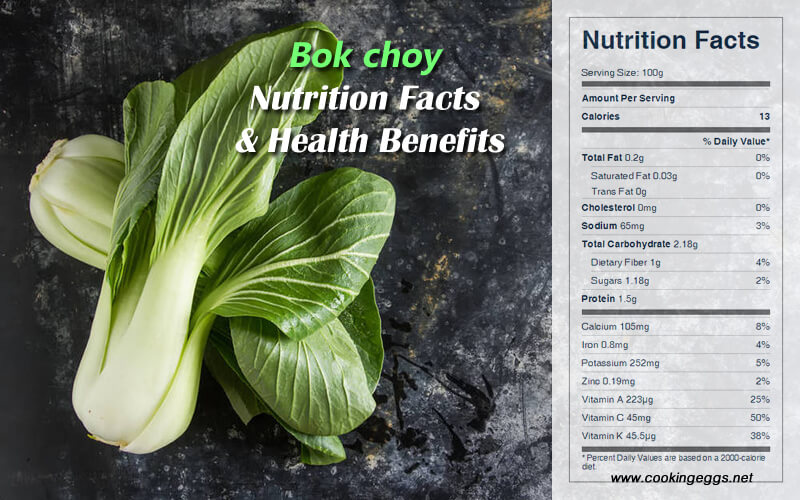Bok choy Nutrition Facts & Health Benefits
Bok choy is a type of Chinese cabbage and is one of the cruciferous vegetables. Bok choy is a leafy vegetable that is delicious added to stir fries. It has a flavor between spinach and water chestnuts but is slightly sweeter, with a mildly peppery undertone. The green leaves have a stronger flavor than the white bulb.
Bok choy is hardy and is being grown in greater numbers in northern Europe. They are a member of the family of brassicaceae or cruciferae, also commonly known as the mustards, the crucifers, or the cabbage family.
The family of cruciferous vegetables, which includes broccoli, cabbage, turnips, and kohlrabi, provides some important cancer-fighting nutrients that are being studied for their potential to not only help prevent some forms of cancer, but also possibly reverse and treat them. Bok choy is a good source of vitamins A, B6, and C, beta-carotene, the minerals calcium and potassium, and dietary fiber.

The nutritional value of Bok choy
Raw bok choy is 95% water, 2% carbohydrates, 1% protein, and less than 1% fat. In a 100-gram reference serving, raw bok choy provides 13 kcal of food energy and is a rich source of vitamin C, vitamin K, and vitamin A, while also providing folate, vitamin B6, and calcium in moderate amounts.
One cup of shredded raw bok choy provides 9 calories, 1.5 g carbohydrate, 1.1 g protein, 0.14 g fat, 0.7 g dietary fiber, 3128 IU vitamin A, 31.5 mg vitamin C, 0.35 mg niacin, 0.06 mg pantothenic acid, 0.14 mg vitamin B6, 46 mcg folic acid, 25.1 mcg vitamin K, 74 mg calcium, 0.56 mg iron, 13 mg magnesium, 26 mg phosphorus, 176 mg potassium, 46 mg sodium, and 0.13 mg zinc.
Bok choy Nutrition Facts Label
Health Benefits of Bok choy
Bok choy is an excellent source of the key antioxidant, vitamin C. It is an essential nutrient for humans. Vitamin C deficiency leads to impaired collagen synthesis, contributing to the more severe symptoms of scurvy. It also contains soluble fiber that lowers the risk of heart and circulatory diseases.
Bok choy is rich in vitamin A. The rich amount of beta-carotene (2,167 mcg in a half-cup of cooked bok choy) may even help reduce the risk of cataracts. These compounds possess antioxidant properties, and together with vitamin A, they help protect the retina. It is also essential for good eyes.
It’s a good source of selenium, which helps thyroid function. Selenium is an important mineral to support thyroid function because it aids in the conversion of our active thyroid hormone. When this conversion process is hindered, common symptoms of hypothyroidism can arise. Studies have found high selenium exposure is related to a lower risk of various cancers.
Bok choy has phytonutrient phenolic compounds that exhibit antioxidant capabilities, such as hydroxycinnamic and malic acid. When we consider the full spectrum of antioxidant availability, the number of antioxidants in bok choy exceeds seventy-five. Additionally, flavonoids such as quercetin, kaempferol, and isorhamnetin are found in bok choy.
Like other brassicas, bok choy contains the sulfur-containing compounds glucosinolates. Compared to the shoots of other Brassica vegetables, glucosinolates in boy choy shoots were found in greater concentrations.
Bok choy is also a great source of omega-3 fatty acids. There are about 70 milligrams of alpha-linolenic acid (ALA) in one cup (70 grams) of cooked bok choy. ALA, an omega-3 fatty acid, reduces the production of pro-inflammatory compounds, including the cytokines TNF-alpha and IL-1 beta. Typically, omega-3 is anti-inflammatory and omega-6 is proinflammatory. The human diet has evolved from an omega-6 to an omega-3 ratio of 1:1 to a ratio close to 15:1 because of the consumption of more processed foods and industrial animal and dairy farming.
The antiinflammatory properties of bok choy come from its phytonutrient content and omega-3 fatty acids. Consuming more omega-3 is important to reduce inflammation caused by omega-6 fatty acids. Reducing the omega-6 to omega-3 ratio has a direct role in reducing inflammation, and eating bok choy clearly can help make that happen!
In addition to bok choy, the cruciferous vegetables, or brassicae, include broccoli, cabbage, cauliflower, kale, kohlrabi, Brussels sprouts, rutabaga, turnip, and mustard greens. Consumption of vegetables from this group has shown a strong correlation with a reduced risk of cancer. These vegetables have been found to contain the chemical precursors that the body turns into powerful anti-carcinogens.